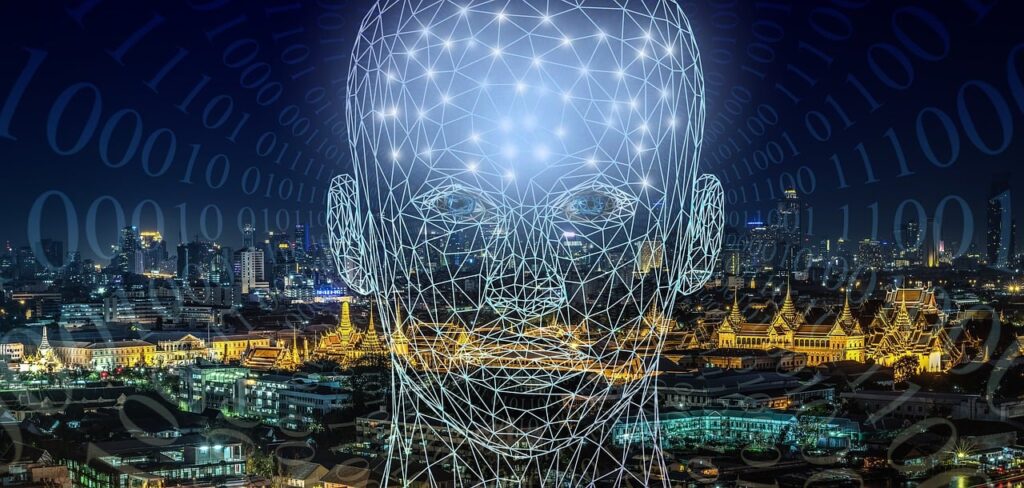A number of industries worldwide have been changed by artificial intelligence (AI). From healthcare to finance, manufacturing to transportation, AI is making a significant impact by improving efficiency, accuracy, and productivity. In this article, we will explore how AI is influencing different sectors and the potential it holds for the future.
Introduction
Rapid AI development in recent years has prepared the door for ground-breaking inventions.AI technologies like machine learning and natural language processing can process enormous amounts of data, which can then be utilized to learn and make wise judgements. This has given businesses in several sectors significant chances to streamline their processes and provide clients with improved services.
1. Artificial Intelligence Overview
Before diving into the specific impacts, it’s essential to understand the basics of AI. Artificial intelligence is the process of simulating human intelligence in machines so that they may carry out tasks that ordinarily call for human intellect. Speech recognition, problem solving, decision-making, and pattern recognition are some of these activities.
2. Impact on Healthcare
The healthcare industry has experienced significant benefits from the integration of AI. One of the most notable impacts is in diagnostics. AI algorithms can analyze medical images, such as X-rays and MRI scans, with remarkable accuracy, assisting doctors in detecting diseases at an early stage. Additionally, AI enables personalized medicine by analyzing patient data and tailoring treatments based on individual needs.
2.1 Improved Diagnostics
AI-powered diagnostic systems have the potential to revolutionize medical diagnoses. By leveraging deep learning algorithms, these systems can detect subtle patterns in medical images that might be missed by human observers. This leads to earlier and more accurate diagnoses, ultimately saving lives and improving patient outcomes.
2.2 Personalized Medicine
An new area called “personalized medicine” seeks to provide patients specialized care. In order to create personalized therapies, artificial intelligence (AI) analyses enormous volumes of patient data, including genetic data and medical history. This strategy may result in medicines that are more efficient and have fewer adverse effects, giving patients better healthcare.
3. Artificial Intelligence Impact on Finance
The finance industry has embraced AI to streamline operations and enhance decision-making processes. AI-powered algorithms are used for automated trading, where they can analyze market trends and execute trades at high speeds, maximizing profits for investors. Additionally, AI helps in fraud detection by identifying suspicious activities and patterns that may indicate fraudulent behavior.
3.1 Automated Trading
Automated trading, also known as algorithmic trading, relies on AI to make swift and accurate investment decisions. AI algorithms analyze historical market data, identify patterns, and execute trades based on predefined strategies. This approach eliminates human emotions and biases, leading to more consistent and profitable trading outcomes.
3.2 Fraud Detection
Financial institutions face the constant challenge of detecting and preventing fraudulent activities. Machine learning algorithms are used by AI-based fraud detection systems to instantly analyze huge volumes of transactional data. By identifying anomalies and patterns associated with fraudulent behavior, these systems can flag suspicious transactions and minimize financial losses.
4. Artificial Intelligence Impact on Manufacturing
The manufacturing industry is leveraging AI to drive automation and enhance productivity. AI-powered robots and machines can perform complex tasks with precision and efficiency, reducing human error and increasing overall production output. Quality control processes have also benefited from AI, ensuring that only products meeting the highest standards reach the market.
4.1 Automation and Efficiency
AI-driven automation has revolutionized manufacturing processes by eliminating repetitive and labor-intensive tasks. Robots equipped with AI algorithms can handle assembly lines, packaging, and other manufacturing operations, leading to increased productivity and reduced costs. This allows human workers to focus on more complex and creative tasks, ultimately boosting innovation within the industry.
4.2 Quality Control
Maintaining product quality is crucial for manufacturers to meet customer expectations. AI systems can analyze sensor data from production lines in real-time, detecting defects and deviations from quality standards. By flagging potential issues early on, manufacturers can take corrective actions promptly, minimizing waste and ensuring consistent product quality.
5. Artificial Intelligence Impact on Transportation
The transportation sector is undergoing a significant transformation with the introduction of AI. Predictive analytics, autonomous cars, and traffic management technologies are revolutionizing how we commute and travel. AI technologies are improving safety, efficiency, and reducing traffic congestion.
5.1 Autonomous Vehicles
Autonomous cars driven by AI have the potential to completely change the transportation sector. Modern sensors, computer vision, and AI algorithms are used by self-driving vehicles and trucks to traverse the road and make quick choices. This technology has the ability to improve traffic flow, lessen accidents brought on by human mistake, and improve road safety.
5.2 Traffic Management
Traffic jams is a serious problem in urban areas. To improve traffic flow and reduce jams, AI-based traffic management systems analyze real-time data from several sources, such as traffic cameras and GPS devices. These systems can recommend other routes by recognizing trends and forecasting traffic conditions, saving passengers time and cutting carbon emissions.
6. Artificial Intelligence Impact on Customer Service
AI has transformed customer service by enabling businesses to provide personalized and efficient support. Chatbots and virtual assistants powered by AI algorithms can handle customer queries and provide relevant information, freeing up human agents to focus on more complex issues. This improves response times, enhances customer satisfaction, and reduces operational costs.
6.1 Chatbots
Chatbots are AI-driven conversational agents that interact with customers in real-time. These virtual assistants can answer frequently asked questions, provide product recommendations, and assist with basic troubleshooting. By harnessing natural language processing capabilities, chatbots offer personalized and responsive support, enhancing the overall customer experience.
6.2 Virtual Assistants
Virtual helpers like Apple’s Siri and Amazon’s Alexa are becoming more and more common in homes. These AI-powered assistants can use voice commands to carry out activities like setting reminders, playing music, and operating smart gadgets. By understanding natural language and adapting to user preferences, virtual assistants provide a seamless and convenient user experience.
7. Artificial Intelligence Impact on Education
AI is transforming the education sector by offering personalized learning experiences and intelligent tutoring systems. Adaptive learning platforms powered by AI algorithms analyze student performance and tailor educational content to individual needs, improving engagement and knowledge retention.
7.1 Personalized Learning
In traditional education, there is frequently a one-size-fits-all philosophy. AI technologies enable personalized learning by assessing students’ strengths and weaknesses, adapting content accordingly, and providing targeted feedback. This approach fosters a more effective learning environment, catering to each student’s unique requirements and maximizing their academic potential.
7.2 Intelligent Tutoring
Intelligent tutoring systems leverage AI to provide interactive and personalized guidance to students. These systems analyze student responses, identify areas of difficulty, and offer customized explanations and practice exercises. By emulating human tutoring, AI-powered systems can enhance comprehension and help students achieve better learning outcomes.
8. Artificial Intelligence Impact on Entertainment
The entertainment industry has witnessed a significant impact from AI in areas such as content recommendation and enhanced gaming experiences. AI algorithms analyze user preferences, viewing habits, and historical data to provide personalized recommendations for movies, TV shows, music, and books. In the gaming sector, AI enhances gameplay through realistic simulations, intelligent NPCs (non-player characters), and adaptive difficulty levels.
8.1 Content Recommendation
Streaming platforms, such as Netflix and Spotify, leverage AI algorithms to suggest relevant content based on user preferences and behavior. By understanding patterns in viewing or listening habits, AI-powered recommendation systems can offer personalized suggestions, introducing users to new and engaging content.
8.2 Enhanced Gaming
AI technologies have revolutionized the gaming industry by introducing more immersive and intelligent gaming experiences. Game developers utilize AI algorithms to create lifelike virtual worlds, intelligent NPCs, and adaptive gameplay. AI also enhances game graphics, physics simulations, and realistic character animations, providing gamers with a more immersive and enjoyable experience.
Conclusion
Artificial Intelligence has made a profound impact on various industries, transforming the way businesses operate and improving services for consumers. From healthcare to finance, manufacturing to transportation, AI is driving efficiency, accuracy, and innovation. As AI continues to advance, its potential to revolutionize industries and shape our future is immense.
FAQs
1. Is AI replacing human workers in these industries? No, AI is not replacing human workers entirely. Instead, it is augmenting their capabilities and automating repetitive tasks, allowing them to focus on more complex and creative work.
2. Are there any ethical concerns with the use of AI in industries? Yes, the use of AI raises ethical concerns, such as data privacy, algorithmic bias, and job displacement. It is crucial for industries to address these concerns and ensure responsible and ethical AI implementation.
3. How can small businesses benefit from AI? Small businesses can benefit from AI by leveraging affordable AI tools and platforms that offer automation, customer insights, and personalized marketing strategies, helping them compete with larger enterprises.
4. Will AI replace human doctors in healthcare? AI will not replace human doctors but will assist them in making more accurate diagnoses, analyzing patient data, and developing personalized treatment plans. The human touch and expertise of doctors will remain crucial in healthcare.
5. How can individuals prepare for the AI-driven future? Individuals can prepare for the AI-driven future by developing skills that complement AI technologies, such as data analysis, critical thinking, and creativity. Lifelong learning and adaptability will be essential in embracing the opportunities brought by AI.



